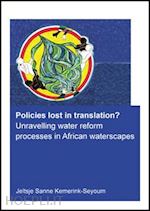1. An Introduction 1.1 Societal relevance: Simplicity on paper, complexity in practice? 1.2 Scientific relevance: complexity on paper, simplicity in practice?1.2.1 Conceptualizing institutions 1.2.2 Conceptualizing policies 1.2.3 Conceptualizing the interplay between policies and institutions1.2.4 Understanding waterscapes 1.3 Objectives of the dissertation and research questions 1.4 Research methodology 1.4.1 Epistemological considerations 1.4.2 Research strategy 1.4.3 Research approach and methods 1.5 Structure of the dissertation 2. Assessment of the potential for hydro-solidarity within plural legal conditions of traditional irrigation systems in northern Tanzania Abstract 2.1 Introduction 2.2 Theoretical insights: hydro-solidarity and legal pluralism 2.3 Introduction to the case study area 2.4 History of the Manoo irrigation system 2.5 Impact of legal pluralism on water sharing practices 2.5.1 Water sharing with other irrigation systems 2.5.2 Water sharing within Manoo irrigation system 2.5.3 Water sharing practices at irrigation zone level 2.6 Discussion and conclusions 3. Contested water rights in post-apartheid South Africa: The struggle for water at catchment level Abstract 3.1 Introduction 3.2 Theoretical framework: contested water rights 3.3 Historical and institutional context of the catchment 3.4 Contested water rights in the catchment 3.4.1 Category 1 – Access to and control over water 3.4.2 Category 2 – Content and interpretation of water rights 3.4.3 Category 3 – Participation in decision making 3.4.4 Category 4 – Discourses underlying water law and implementation policies 3.5 Discussion and conclusions 4. The question of inclusion and representation in rural South Africa: challenging the concept of water user associations as a vehicle for transformation Abstract 4.1 Introduction Table of Contents4.2 Theoretical considerations 4.3 Setting the scene 4.4 Establishment of water user associations 4.4.1 Process on paper 4.4.2 Process in practice 4.5 Reflections on inclusion 4.6 Reflection on representation 4.7 Discussion 5. Why infrastructure still matters: unravelling water reform processes in an uneven waterscape in rural Kenya Abstract 5.1 Introduction 5.2 Theoretical considerations 5.3 Setting the Scene 5.4 Narrating the Kenyan water reform process 5.5 The Kenyan policy model5.6 Unfolding the policy model in Likii catchment 5.7 Unravelling the implications for water users 5.8 Discussion 6. Jumping the water queue: changing waterscapes under water reform processes in rural Zimbabwe Abstract 6.1 Introduction 6.2 Theoretical considerations 6.3 Setting the scene 6.4 The Zimbabwean water reforms6.5 Unfolding the water reforms in Nyanyadzi catchment 6.6 Reordering the Nyanyadzi waterscape 6.7 Discussion 7. Discussion and conclusions: From water reform policies to water resource onfigurations 7.1 Introduction 7.2 A synopsis of the research findings 7.3 The emerging water resource configurations 7.4 Policies lost in translation? 7.5 Connecting policies with the outcomes 7.6 Contribution to policy practice 7.7 Contribution to theories, concepts and methodology 7.8 Further research 7.9 Epilogue: a critical reflection on the research References Annex A: Water allocation practices among smallholder farmers in the South Pare Mountains, Tanzania; can they be up-scaled Annex B: The quest for water: Strategizing water control and circumventing reform in rural South Africa











